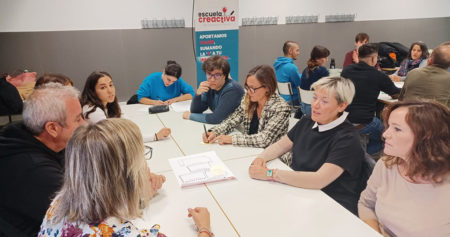We share the proposals that emerged at a political and social regulars’ table in Alicante to promote social change in science, the economy and among the youth as a target group.

Within the framework of the Escuela Creactiva project, a round table on political and social advocacy was held on 29 November at the University of Alicante. The activity concluded a social innovation laboratory aimed at students of the Master’s degree in Social Innovation and Dynamics of Change, supported by the Department of Equality and Inclusive Policies and the Valencian Agency for Innovation (AVI).
The social innovation training programme dealt with different contents such as creativity as a tool or the practical application of gamification to improve the design of innovative projects using a special method developed by Jovesólides, Factor 5. The Political and Social Engagement Round Table was the final activity where the students of the programme had the opportunity to interact with external experts to develop ideas and proposals for collaboration.
This session, in a world café format, allowed all participants to share, develop ideas and find creative and innovative ways to take action based on three important questions, to which participants worked together to come up with different solutions that we shared:
How to train social empowerment as a strategy to develop young employment?
In response to this question, many suggestions were made involving different actors and processes, but the following were chosen by those present as the strongest ideas. One of these is linked to employment as such, which promotes youth employability and addresses the structural problems of young people through employment and associations by creating cooperative networks between the administration and young people.
Young social entrepreneurship was also mentioned as a strategy, with the aim of activating the economy in neighbourhoods and areas, always based on a pact between the state and the target audience. Finally, the area of education was also considered essential in fostering young people’s entrepreneurial skills by making them aware of social problems and giving them access to information so that they know how to address and overcome them.
How to develop social innovation in the business sector? 
There are also numerous approaches to this challenge that aim to involve the corporate sector more in social engagement. In this case, there were three strong ideas that were more strongly considered by the majority of participants. On the one hand, promoting corporate social responsibility, which is directly linked to the Sustainable Development Goals (SDGs), in the context of SMEs in order to generalise this responsible approach in corporate work. In addition, a renewal and innovation of the labour recruitment and inclusion system was proposed, including an accompaniment programme and easier payment of quotas for those who start a business. The third most important idea was to overhaul the working time and benefit system to create a genuine training system that would ensure the acquisition of new skills for employment.
How to develop social innvation on the educational sector?
With regard to this third question, there were also many and very different ideas, which also looked at very different angles. The strongest final idea chosen was a platform that connects all social actors involved in the education system, where they can have their say and make decisions, and which in a way promotes consensual decision-making. It has also been suggested to create active and dynamic channels of participation and communication for students where they can also participate in decision-making. Finally, the third idea was to include a subject and content on creativity and innovation in the academic curriculum that would give imagination a respected space and, together with emotional intelligence, would enable people to improve their personal resources, be more autonomous, proactive and responsible, and that all this could have an impact on building their professional future.
This register of proposals is an example of how positive it is to create spaces for participation and for opposing opinions. It is also an example of how people from different backgrounds who are asked to find solutions or propose ideas are able to reach consensus and come up with ideas that can potentially bring about relevant social change. This is why the Escuela Creactiva exists, to encourage this type of meeting and to look for creative solutions to current social problems.

